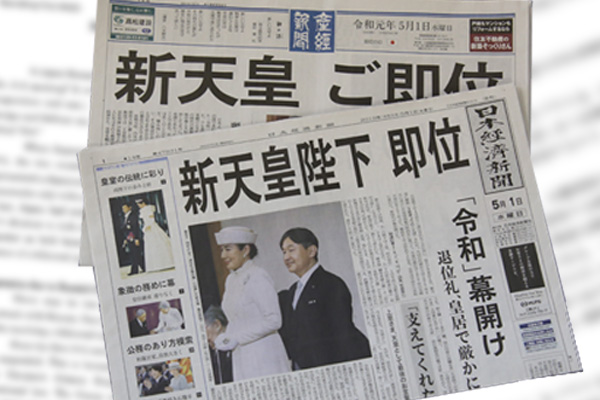While the meaning of Japan’s new imperial era name “Reiwa” still remains controversial, I would like to leave experts to argue about it. Here, I would like to make two other points. First, no serious arguments have been made about Japan’s national characteristics even amid the extraordinary imperial family fever that came as the new era started on the May 1 imperial succession. Second, reports by Japan Broadcasting Corporation, the only Japanese public broadcaster known as NHK, have been sending a subtle signal of anti-war/pacifist ideology.
Let’s deliver Japan’s national characteristics to the world
Although academicians have made very vague arguments about whether Japan is a constitutional monarchy or a republic, Japan has built a 2,000-year-long history that differs from those of European monarchies and may be concluded as a constitutional monarchy that is characteristically different from European monarchies.
As 19th-century famed critic Fukuzawa Yukichi says in his Teishitsuron (On the Imperial Household) that Japan’s imperial household is at the center of winning the hearts of the people with a very great blessing, the Japanese imperial household differs from European royal families established through the conquest of people. Let’s clarify the difference and deliver Japan’s identity to the world.
Japan’s constitution has no provision about the head of state. While few Japanese can answer the question of who the head of state is, foreigners generally consider the emperor to be the head of state. I think that the time has come to change such shameful situation.
I have had strange feeling about a NHK report in which a first or second grader child looking innocent told a reporter that a more peaceful era is desirable. I questioned why the child hoped for peace while being unaware of any real war.
The NHK report said the most common answer in its poll about what respondents hoped for in the new era of Reiwa was “peace.” Implied in the report is the existence of anti-war/pacifist ideology. It is unnatural for elementary school pupils to mention peace. When an anti-war/pacifist mood spreads on dominant media reports, people or groups calling for constitutional amendments or advocating national security may be considered “pro-war.” The fact is totally opposite.
Break away from anti-war ideology
We now face China’s huge political ambition. Waves of the Chinese ambition represented by the Belt and Road Initiative are spreading not only to Asia, the Middle East and Europe but also to the Pacific Ocean countries including Tonga, Fiji and the Solomon Islands. A Japanese prefectural governor visited Beijing recently to ask China to use Okinawa as a gateway to Japan under the BRI. He is ridiculous.
Regardless of how the U.S. Trump administration should be assessed, I believe that public opinions of the United States, the indispensable ally for Japan, have never been so divided over a president. Japanese Prime Minister Shinzo Abe has forged a solid relationship with President Donald Trump, but the closeness is accompanied by big risks.
We might have entered an age where Japan could be ridiculed in the world unless it sheds its pacifism.
Tadae Takubo is Vice President of Japan Institute for National Fundamentals and a professor emeritus at Kyorin University.


